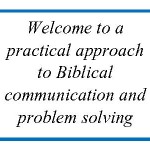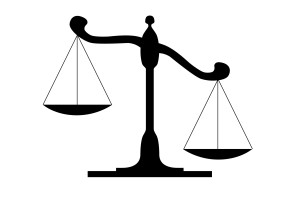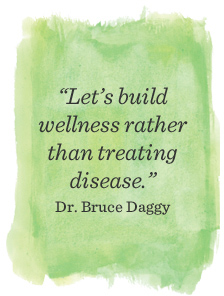We can change our actions faster than we can change our feelings. This is an easy lesson to understand, making it easy to teach, because we have all perhaps been there and done this at some point in our lifetime. Picture the following scenario: Two people are feuding, fussing and fighting or yelling, hollering …
Category: Changing Your Actions Regardless of Your Feelings
Feb 15
Prescription for Great Communication: Bless, Edify, Share and TOUCH
In our previous articles we have been expanding on the full breadth of communication through the acronym BEST. We have noted this is a prescription written by Dr. Ed Wheat, M.D. in his book Love Life for Every Married Couple for attaining and maintaining Great Communication: Bless, Edify, Share and Touch. The principles we have …
Feb 08
Prescription for Great Communication: Bless, Edify, SHARE and Touch
In our previous articles (here and here), we have been expanding of the full breadth of communication through the acronym BEST. We have noted this is a prescription written by Dr. Ed Wheat, M.D. in his book Love Life for Every Married Couple for attaining and maintaining Great Communication: Bless, Edify, Share and Touch. …
Feb 01
Prescription for Great Communication: Bless, Edify, Share and Touch
Last time I introduced Dr. Ed Wheat, M.D., and his best selling book, Love Life for Every Married Couple. I noted many of the prescriptions Dr. Wheat issues are applicable to relationships outside of marriage. As a physician, he offers the following prescription stated in this acronym: The BEST prescription for a superb relationship: …
Jan 25
The Mechanics of Silent and Listen
Last time we stated that just because a person is silent it does not pre-conclude they are listening. Indeed, the silent person may the thinking of their reply or retort. In either case the listener may be missing out on important details being shared. This would be particularly critical in trying to build or …
Jan 18
Communication Is a Two-Way Avenue
A placard displayed in a frame shop window attracted my attention causing me to pause and mediate upon the two-word inscription. This vital truth attracted me as a teaching tool for our counseling ministry. As a teaching technique I use impact statements based on a verse, passage or Biblical principle. These impact statements deal …
Jan 13
Comparison Is Spelled K-I-L-L-E-R
Glancing back at last week’s article, I repeat: Emily Dickenson, in one of her poems said, “A word is dead when it is said, some say; I say it just begins to live that day.” To say comparison is spelled K-I-L-L-E-R is a lesson in stark reality. Comparison is the key element in advertising …
Jan 04
Negative Humor and the Sensitivity Level
Emily Dickenson, in one of her poems said, “A word is dead when it is said, some say; I say it just begins to live that day.” Lawrence J. Crabbe, in his book The Marriage Builder said, “Words do one of three things: Words can give life; they can wield death; or they can …
Dec 28
How to Attack the Problem without Attacking the Person
Last time we looked at the first two phases of the following diagram. This time we will walk through the third phase. In a brief review we saw when a problem presented itself two people often attack each other – which obviously doesn’t resolve the issue. Next they begin to attack the problem the way …
Dec 22
Attack the Problem and Not the Person
This principle is based on the axiom: An ounce of prevention is worth a pound of cure. If we can prevent a problem from developing, obviously, we do not have to cure that problem. But how do we do this? This is a three-step process outlined by the following diagram. This is taught in the …
Dec 15
Don’t Try to Make it Make Sense – Right Now
Many subliminal signals alert us that something is amiss. Our five senses of human nature, to wit: hearing, seeing, feeling, smelling and tasting work separately, or in concert, for the purpose of warning us and prompting us to take averting action(s). Yes, instant action is often appropriate; if the house is on fire call …
Dec 08
Cover Over Problems Effectively
In this series we are looking at three ways people attempt to solve problems that do not work and why they do not work. First we pointed out that a person’s objectivity for problem solving is often based on their most recent experience(s). We concluded this is an ineffective tool for problem solving for …
Nov 30
Things People Do To Solve Problems That Do Not Work and Why They Do Not Work
There are three primary things people do to solve their problems that don’t work. Objectivity in Problem Solving Cover Over Problems Effectively Don’t Try to Make it Make Sense Right Now Starting this week and for the following two weeks we’ll examine why these approaches do not work. Doing things that have not worked …
Nov 23
The Three Levels of a Problem
The first level of a problem usually begins as a feeling accompanied by a thought. We think something doesn’t seem to be right. We’re not certain what is amiss, but we feel there is something going on. Following this thoughtful feeling, if we haven’t concluded what may be amiss, we voice our concern to a …
Nov 16
The Problem is ________________.
My father-in-law during his latter years, he died at age 94, would reply when asked how he felt, “Well, I hurt all over more than any where else,” which usually evoked a chuckle from the inquirer. But would that answer satisfy his physician? Would that answer satisfy a counselor? The obvious answer is, “No.” …
Nov 09
Problems Are Solutions in Disguise
This may seem an over-simplification of all you have been struggling with for perhaps too long, but it is not. God’s Word has a solution for every problem known to mankind. A key verse supporting this teaching is I Corinthians 10:13: “There hath no temptation taken you but such as is common to man: …
Nov 02
Choices, Choices, Choices
From the moment our day begins until it ends we make choices. Choices are amoral, that is, being neither moral nor immoral. Like sins, however, choices carry consequences. First John 1:9 gives partial relief to the repentant sinner: “If we confess our sins, he is faithful and just to forgive us our sins, and to …
Oct 26
You Can’t Steer a Parked Car
We are continuing to look at making life-altering changes. Making superficial and situational changes we learned are not permanent changes – they are temporary. Substantial change, that is, a change of attitude can be permanent by maintaining a new, and better, attitude accompanied by changing the direction of our behavior. However, you can’t steer …
Oct 19
Third of the Three Levels of Change: The Substantial Level
Repeating from last week, the first time I heard the statement, There is no change if there is no change, I thought it redundant. But after the Holy Spirit explained it to me I saw the value of this truth: If you want tomorrow to be different from yesterday, you must do something different today …
Oct 13
Second of the Three Levels of Change: Situational Level
The first time I heard the statement, There is no change if there is no change, I thought it redundant. But after the Holy Spirit explained it to me I saw the value of this truth: If you want tomorrow to be different from yesterday, you must do something different today – different as in …

Do You Need Help:
- Applying Biblical Principles to Everyday Problems
- Becoming One Flesh with Your Spouse
- Changing Your Actions Regardless of Your Feelings
- Discovering and Developing Your Spiritual Gifts
- Getting Rid of Guilt and Resentments
- Identifying and Isolating Problems
- Knowing God's Will for Your Life
- Uncategorized
Search Website
Archives
What People Are Saying
God is working mightily through Tom Lacy and the New Hope Counseling Service ministry. The name is fitting. When we first came to see Tom, we had little hope that our marriage would make it. Attending that first meeting was our last investment of hope. Through the Grace of God, we left that meeting with a renewed hope that God could and would put our marriage back together. We stand today amazed at the miracle that is our marriage now. Our love is remembered, renewing, and growing day-by-day. Our children are blessed with a more peaceful home and we are enjoying their smiles of relief and joy. With God, there IS hope and He used New Hope Counseling Service to show us that Truth! Please don't give up! Call New Hope Counseling Service and let God lead your marriage to a new hope. - L.M. Richmond
*
Testimonials page coming soon!
Donate to the Ministry
Subscribe to my Blog
CREATING the male first did not establish his superiority, rather it established his need: And the Lord God said, It is not good that the man should be alone.
CREATING the female second did not establish her inferiority, rather it established her mission: I will make an help meet for him.























